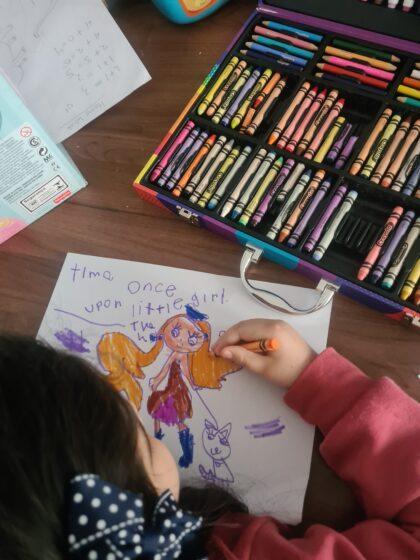The Science of Teaching Science
Having an effective understanding of science is incredibly important both for the individual and society. Children are entitled to know how the world works – without this knowledge their lives aren’t as rich. A good understanding of science will allow them as adults to make informed decisions on important matters, such as voting, or receiving a vaccination as has been seen recently. And it opens doors to numerous careers in a huge range of fields, not just the ‘traditional’ science professions.
Our approach to teaching science is different from some schools, as they will use an inquiry-based learning approach, which involves minimal guidance from the teacher and pupils designing their own experiments to check their own hypotheses. For example, this could take the form of asking the children to look at a bug and see what they can find out. However, an increasing number of studies show this is ineffective as, without having the right knowledge in place, children won’t know the questions they need to ask to get the most out of the approach.
To teach science effectively we, and all Paradigm schools, use a ‘knowledge-first’ system instead, which focuses on teaching children the scientific knowledge before anything else. The teacher breaks problems into manageable parts and shows the solution to each, before the children practice using similar problems. By doing this, the children then have the foundation they need to be able to do the inquiry-based learning effectively. It also helps the children develop essential skills such as problem solving, understanding scientific texts or extrapolating accurate conclusions from results.
Another way we improve science outcomes is to meet regularly with teachers from the other schools in Paradigm Trust to share ideas. A large proportion of time is spent discussing ways in which children can be better prepared for the move from primary to secondary school, and how to make science effective from Nursery to Year 9. We have found by doing this there is now less disruption when pupils move from Year 6 to Year 7 and their learning experience is far smoother. Much of this work is led by Ben Rogers who is on the Education Committee at the Institute of Physics, and on the editing panel for the Association of Science Education journal. He is also part of the Ofsted Science advisory group, with a particular focus on primary schools.
Since we have been working this way it is noticeable that children are achieving better results and becoming more engaged in the subject. Between now and the end of the school year our curriculum will cover a huge range of scientific topics, including Forces and Magnets, Living Things and their Habitats, Light and Sound, Renewable Energy and Earth and Space.
Learning in Lockdown

Despite the current challenges around the majority of our pupils learning from home, we have started the term on a high by ensuring children both at home and in school experience the same quality-first teaching and learning they would get in the classroom.
This is as a result of the extensive planning and preparation we had done before the start of the year. We took the findings and insights we gained during the first period of lockdown last spring and summer, and with other Paradigm Trust schools built a robust plan of action which we could apply should we need to close and engage in remote learning again.
Our preparation continued when children were back in school. As you will know, all year groups apart from Y6 and EYFS had a period of isolation in the autumn term when they were remote learning from home using devices. This helped children get used to the new blended learning system, and our staff become adept at teaching remotely.
So when, with barely twelve hours’ notice, the official notification that schools would be closed to all children (apart from vulnerable and key worker children) was received, we were able to move swiftly to remote learning with a minimum of disruption. Now around 75% of our remote lessons are taught live, including daily for Reading, English and Maths plus twice a day for registration. To ensure pupils have access to as broad a curriculum as possible we offer live lessons in Spanish and Music too.
Other lessons, including Science, Geography, Computing, Art and Design, DT and PE, are taught using bespoke video lessons created by curriculum leads from across the Trust.
One of the major challenges during the first lockdown was the digital divide, with many families unable to access the online resources available due to a lack of appropriate devices and/or a reliable internet connection with sufficient data allowance. To overcome this challenge we have issued school laptops to any children who are learning from home and don’t have access to technology; so far 380 Chromebooks have been allocated. Where families don’t have access to WiFi, we’ve purchased dongles and data for them. Non-digital resources, such as reading books, are also issued to pupils and we have stocked up on extra resources such as glue, paint and materials for Art which can be picked up from school for pupils working from home.

We want to ensure all our pupils continue to get the support they need, so teachers and teaching assistants work together as they would normally to provide bespoke support to small groups of children, using virtual breakout rooms via Google Hangouts as lessons are being taught. Where needed, pupils also receive one to one support.
We are also reaching out to families with phone calls and house visits where necessary, and we offer the voucher scheme for families eligible for free school meals.
Lockdown is a challenge, but one we are meeting head-on. It is an opportunity to adapt and improve our teaching and learning, both in the classroom and remotely online. As we would do in normal circumstances we are seeking the most effective ways to teach, testing different innovations and then sharing those that have been proven to be effective with the rest of the school and the entire Trust. It is our goal to always deliver an effective, challenging and interesting remote learning experience for our pupils, so they can all achieve their best.

